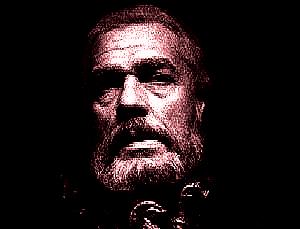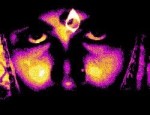Film Review

Brook's film directing credits barely make it into double figures, although he has delivered some notable works, including his brooding French drama Moderato cantabile (1960) and a well regarded adaptation of William Golding's Lord of the Flies (1963). King Lear is Brook's most inspired cinema offering to date, a film which, like Orson Welles' Macbeth (1948), conjures up a coherent universe that is both real and dreamlike, one where the actions of men are governed by dark primeval forces that cannot be opposed, and where every line of Shakespeare's text resonates with an eternal truth.
Paul Scofield's portrayal of Lear is the film's greatest achievement, not that you would expect anything less for an actor of this calibre. His life energies spent, his intellectual powers waning, Scofield's Lear is a lion who can no longer roar, a once great behemoth of a man who is reduced to a ranting old man, a vain fool who cannot see past the smiling visages to discern the calculating villains that surround him. The tragedy of a man humiliated by the vagaries of old age and betrayed by his offspring is given a searing poignancy through Scofield's restrained yet commanding performance. His last few scenes are so blisteringly true to life, so filled with anguish, that they are an ordeal to watch. Surely no actor has ever played Shakespeare's Lear with such force and humanity. Surely there has never been an adaptation of the play that is so viscerally cruel and bleak.
© James Travers 2010
The above content is owned by frenchfilms.org and must not be copied.
Film Synopsis
In his ninth decade, a weary King Lear decides to surrender his power and distribute his estates amongst his three daughters, according to how much love they have for him. Goneril and Regan, Lear's eldest daughters, impress the King with their extravagant professions of love, but Cordelia, his youngest, merely angers him when she says, honestly, that the only love she can give him is the same love that any daughter owes her father. The die is cast: Lear divides his kingdom between his eldest daughters and disinherits Cordelia, refusing ever to see her again. Kent, the King's most loyal knight, protests, but this merely further Lear's anger and he too is banished. With the governance of his land now in the hands of his daughters and their husbands, Lear chooses to live in retirement at Goneril's castle. The debauched behaviour of Lear's hundred or so attendants so offends Goneril that she rails against her father and insists that he must reduce his retinue to no more than a few dozen men. Lear is so incensed by this show of ingratitude that he disowns Goneril and leaves immediately for Regan's castle. But Regan is no more sympathetic than her elder sister and Lear, realising his error in abdicating his power to two such heartless daughters, rushes out into a violent storm, accompanied by his fool and Kent, disguised as a servant. On a rain-lashed heath, the broken-down king encounters a similarly abused wretch, Edgar, the son of the nobleman Gloucester. Edgar has been betrayed by his illegitimate brother Edmund, who convinced his father that he intended to usurp his position and wealth. Whilst Edgar lives on a barren heath, disguised as a madman, his brother persuades Goneril and Regan that his father is a traitor. As French troops led by Cordelia's husband land in the south of England, the hand of retribution appears to be moving towards Lear's two eldest daughters. Lear finally discovers that he has one child who is true to him, but too late...© James Travers
The above content is owned by frenchfilms.org and must not be copied.
Similar Films
Here are some other films you may enjoy watching:- Au hasard Balthazar (1966)
- Le Petit soldat (1963)
- From the Life of the Marionettes (1980)
- Docteur Françoise Gailland (1976)
- Rue des Prairies (1959)
Other related links:
Film Credits
- Director: Peter Brook
- Script: Peter Brook, William Shakespeare (play)
- Cinematographer: Henning Kristiansen
- Cast: Paul Scofield (King Lear), Irene Worth (Goneril), Cyril Cusack (Albany), Susan Engel (Regan), Tom Fleming (Kent), Anne-Lise Gabold (Cordelia), Ian Hogg (Edmund), Robert Langdon Lloyd (Edgar), Jack MacGowran (Fool), Patrick Magee (Cornwall), Barry Stanton (Oswald), Alan Webb (Gloucester), Søren Elung Jensen (Duke of Burgundy)
- Country: UK / Denmark
- Language: English
- Support: Black and White
- Runtime: 137 min
The best of Indian cinema

Continental Films, quality cinema under the Nazi Occupation

The very best American film comedies
